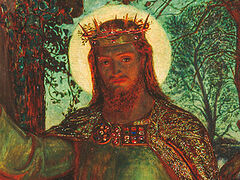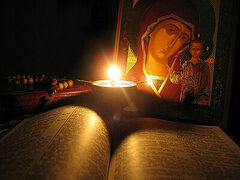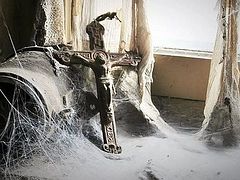His Grace Bishop Atanasije (Jevtić) of the Serbian Orthodox Church reposed in the Lord on March 4. Thousands of Orthodox faithful, including hierarchs, clergy, monastics, and laymen came out to bid farewell to the beloved former hierarch of Zahumlje and Herzegovina at his funeral and burial on March 6. Bp. Atanasije was a spiritual child of the great dogmatician St. Justin (Popović) and was a respected theologian in his own right. In fact, in his message read out at Bp. Atanasije’s funeral, His Holiness Patriarch Porfirije numbers him together with the great theologians Sts. Justin and Nikolai (Velimirović).
In honor of his memory and the first week of Great Lent, we present a translation of a talk he gave in 1988 on repentance, confession, and fasting, which the Church calls us to focus our spiritual energy on during the Great Fast.
Repentance is the beginning of a new Christian life, or a new Christian existence—existence in Christ.
Thus, the Gospel begins with the words of St. John the Forerunner: Repent, for the Kingdom of Heaven is at hand. And Christ’s preaching after His Baptism was Repent and believe in the Gospel.
But in our times, people ask why it’s necessary to repent. From the social point of view, it’s inappropriate to talk about repentance. There is, of course, some semblance of repentance, especially in countries of eastern totalitarianism, when someone has departed from the party line, then “repentance” is demanded of him, or when the party leaders themselves deviate from their initial plan—only it’s not called repentance, but some kind of “reform” or “realignment.”1 There is no real repentance here. How many of you have seen Abuladze’s film Repentance? They talk about false repentance there, and it’s only at the end of the film that you see what true repentance is. The film exposes false repentance as a kind of change in the “ideal” or “style” of power, which remains essentially the same. And indeed, such “repentance” has nothing to do with true repentance.
In the Greek text of Holy Scripture, there are two different expressions for repentance. One expression is metanoia, and the other is metamelia. Sometimes this second expression is translated not as “repentance,” but as “regret.” For example, I thought about going to Frankfurt, but I “regretted,” that is, I changed my mind: I won’t go. In Holy Scripture this is called metamelia. It’s just a change of intent. It has no spiritual meaning. There is also something like “regret” in a social or psychological sense, that is, alterations. In the field of psychology, there is the “restructuring” of one’s character, one’s neurosis. In the depth psychology of Adler, Freud, or even Jung, there is no concept of repentance.
Repentance is a religious concept. You have to repent before someone. It doesn’t mean just changing your lifestyle or your inner feelings or your experience, as it means in, let’s say, eastern religions and cultures. These religions talk about how a man must gain his own experience, must know himself, must self-actualize so the light of his consciousness would awaken. But God is not needed for such a change. But Christian repentance definitely must be before someone.
Here’s an example. One of our Serbs—he’s already sixty now—was a communist in his youth and, like all of them, did much evil towards the people. But then he came to faith, to God, to the Church, and when they offered him Communion, he said: “No, I have done much evil.” “Then go confess.” “No, no,” he says, “I’ll go confess to a priest, but I have sinned before the people, and I must openly confess before the people.”
This is an expression of the full consciousness of what repentance is. Here you see the Church, the ancient Christian, and the truly Biblical perception that man is never alone in the world. Above all, he stands before God, but also before men. Therefore, in the Bible, a man’s sin before God is always related to his neighbor, and that means that it has social, communal dimensions and consequences. This is felt both in our people and in the great Russian writers. Orthodox people have a feeling that some thief or tyrant, or someone who does evil to their neighbor is the same as an atheist. Let him believe in God, but it’s all for naught—he really just blasphemes God, since his life is at odds with faith.
Hence the holistic understanding of repentance as a proper standing before God and before man. Repentance cannot be measured only by social or psychological scales, but is always a Divinely-revealed, Biblical, Christian concept.
Christ begins His Gospel, His good news, His teaching for mankind with repentance. St. Mark the Ascetic, a disciple of St. John Chrysostom, who lived as a hermit in the fourth to fifth centuries in Asia Minor—teaches that our Lord Jesus Christ, God’s power and God’s Wisdom, in contemplating salvation for all, of all his various dogmas and commandments left one single law—the law of freedom, but also that we come to this law of freedom only through repentance. Christ commanded the apostles: “Preach repentance to all nations, for the Kingdom of Heaven is at hand.” And by this the Lord wanted to say that the power of repentance contains the power of the Heavenly Kingdom, just as the leaven contains the bread or the grain contains the whole plant. Thus, repentance is the beginning of the Heavenly Kingdom. Let us recall the Epistle of the Holy Apostle Paul to the Hebrews: Those who have repented have felt the power of the Kingdom of Heaven, the power of the future age. But as soon as they turned to sin, they lost this power, and it was necessary to renew repentance again.
Thus, repentance is not just a social or psychological ability to get along with others without conflict. Repentance is ontological, that is, an existential category of Christianity. When Christ began the Gospel with repentance, He was referring to the ontological reality of man. Let us say in the words of St. Gregory Palamas: The commandment of repentance and the other commandments given by the Lord fully correspond to human nature itself, for in the beginning He created this human nature. He knew that he would then come Himself and give the commandments, and therefore He created nature according to the commandments that would be given. And on the contrary, the Lord gave such commandments as corresponded to the nature He created in the beginning. Thus, the word of Christ on repentance is not a slander on human nature, it is not an “imposition” of something alien onto human nature, but is the most natural and normal thing, corresponding to human nature. The only thing is that human nature is fallen, and therefore, it is now in an unnatural state. But it is precisely repentance that is the lever by which a man can correct his nature and return it to a normal state. Therefore, the Savior said: “Metanoite”—that is, “change your mind,” or, “repent.”
The thing is that our thought has left God, ourselves, and others. And this is the sick, pathological state of man that is called “passion”—in Greek: pathos (pathology). It is simply a disease, a perversion, but not yet destruction, as sickness is not the destruction of an organism, but simply a corruption. The sinful state of man is a corruption of his nature, but man can recover and accept correction, and therefore repentance comes as health to a sick place, to the sick human nature. And as the Savior said that we must repent, even if we don’t feel the need to repent, we must believe Him—that we truly do need to repent. And in fact, the more the great saints drew near to God, the more strongly they felt the need for repentance, inasmuch as they felt the depth of the fallenness of man.
Another example from modern times: A certain Peruvian writer, Carlos Castaneda, has already written eight books about some Indian sage and magician, a Don Juan in Mexico, who taught him to take drugs to achieve the state of a second, special reality, to enter into the depths of the created world and feel its spirituality, and to meet spiritual beings. Castaneda is an anthropologist and has aroused great interest among the youth. And unfortunately, these eight volumes have already been translated into Serbian. There was a discussion in Belgrade a few days ago about Castaneda and whether to accept or reject him. One psychiatrist has said that taking drugs in order to hallucinate is a dangerous path from which it’s unlikely to return. One writer praised Castaneda. I was the harshest critic.
There’s nothing new in Castaneda’s diagnosis of Don Juan. Mankind is in a tragic, abnormal state. But what does he propose in order to get out of this state? To feel another reality, to free yourself a littler from our limitations. And what happens? Nothing! Man remains a tragic being, neither redeemed nor even ransomed. He cannot, like Baron Munchausen, lift himself out of the swamp by the hair. The apostle Paul points out: Neither another heaven, nor another creation, nor the spiritual world, nor the seventh heaven can save man, for man is not an impersonal being who needs but peace and tranquility. He is a living person and seeks a living communion with God.
One Serbian communist peasant said rather rudely: “Well, where is God, so I could grab Him by the throat?” Is he an atheist? No, he is not an atheist, but vividly feels God and quarrels with Him, like Jacob. Of course, it’s an outrage from this Serb to speak this way, but he senses a vibrant life. And to think that salvation is in some sedate bliss, in nirvana, in the inner peace of concentration and meditation leads man nowhere. It even closes the possibility of his salvation, because man is a being created from non-existence into existence and invited to communion.
In the Song of Solomon or in the Psalms we see an existential dialogue between God and man. They both suffer. God is sorry for man, and man is sorry. Dostoyevsky especially clearly showed that when man withdraws from God, he loses something great and precious. Such a blunder, a failure to meet God, is always a tragedy. The tragedy is the consciousness of losing what we could have attained. When man loses love, when he departs from God, he feels it tragically, because he was created for love. Repentance returns us to this normal state, or, at least, the beginning of the normal path. Repentance, as Fr. Justin (Popovi
) said, is like an earthquake that destroys everything that only seemed stable but turns out to be false, and then it’s necessary to change everything that was. Then begins the genuine, constant creation of a personality, a new man.
Repentance is impossible without meeting God. Therefore, God goes out to meet man. If repentance were simply an examination, or contrition, or using our energy differently, it would be a realignment, but not a change in essence. A sick man, says St. Cyril of Alexandria, cannot heal himself, but needs God to heal him. And what is his sickness? The corruption of love. There should be no one-sided love. Love should be, at least, two-sided. But for the fullness of love, in fact, you need three: God, the other, and myself. Me, God, and the other. The other, God, and me. It’s perichoresis, the interpenetration of love, the cycle of love. This is eternal life.
In repentance, man feels that he is sick and he seeks God. Therefore, repentance always has a regenerative power within itself. Repentance is not just feeling sorry for ourselves, or depression, or an inferiority complex, but always the awareness and feeling that communion is lost, and immediately the search and even the beginning of the restoration of this communion. The Prodigal Son came to himself and said: “What a state I’m in. But I have a father, and I will go to him!” If he had simply realized he was lost, it wouldn’t have been Christian repentance. But he went to his father! According to Sacred Scripture, it can be assumed that the father had already gone out to meet him, that the father had taken the first step, and this is reflected in the son’s impulse to return. Of course, it’s not necessary to analyze what’s first or what’s second: The meeting can be two-fold. In repentance, both God and man enter into the activity of love. Love seeks communion. Repentance is regret for lost love.
Only when repentance itself begins does man feel the need for it. You would think a man would first need to feel that he needs repentance, that it is salvation for him. But in fact, paradoxically, it turns out that when man already experiences repentance, then he feels the need for it. This means that the unconscious heart is deeper than the consciousness that God gives to those who want it. Christ said: He that is able to receive it, let him receive it. St. Gregory the Theologian asks who can receive it. And he answers: Whoever wants it. Of course, the will is not just a conscious decision, but much deeper. Dostoyevsky also felt it, and Orthodox asceticism knows that the will is much deeper than the mind of man; it is rooted in the core of man, which is called the heart or spirit. As in the 50th Psalm: Create in me a clean heart, O God, and renew a right spirit within me. It’s a parallelism: a clean heart—a right spirit; create—renew; in me—within me; that is, it’s just confirming what was already said in the first part using other words. The heart or the spirit—it’s the essence of man, the depth of the God-like personhood of man. You can even say that love and freedom are contained in the very center, in the core of man. God’s love called man forth out of non-existence. The call of God was realized and received its response. But this answer is personal! That is, man is the answer to the Divine call.





